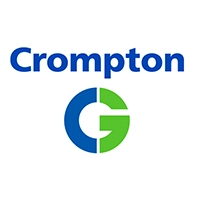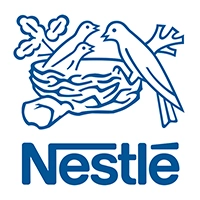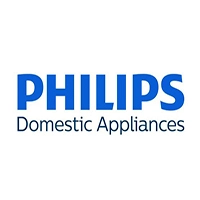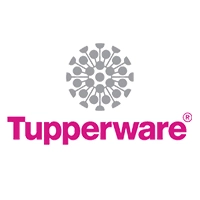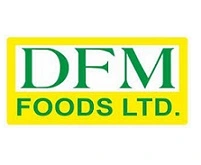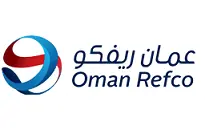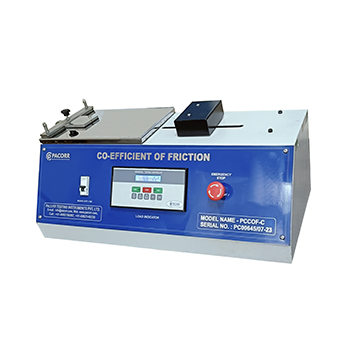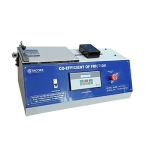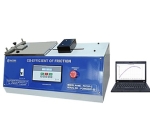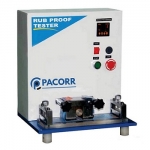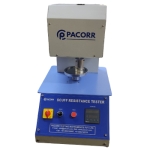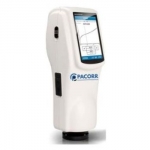Co-efficient of Friction Tester (COF) is highly proficient quality testing equipment that is used to evaluate the Co-efficient of friction for material surface which has a slippery nature like a glossy magazine cover, labels, tape, packaging material like plastic sheet etc. The equipment brings new and advanced technology to precisely examine how such surfaces will react to real-life instances and assess the static and kinetic coefficients of friction for the product.
| Aspect | Detail |
|---|---|
| Purpose | Measure the frictional properties of materials |
| Applications | Packaging, manufacturing, automotive, textiles |
| Benefits | Improves safety, enhances product design, ensures compliance |
| Types | Static, Dynamic |
| Compliance Standards | ASTM D1894, ISO 8295 |
The Coefficient of Friction (COF) Tester is an essential instrument in various industries, designed to measure the frictional properties of materials. This measurement is crucial for assessing material compatibility, ensuring product safety, and enhancing design across applications such as packaging, manufacturing, automotive, and textiles.
Understanding Coefficient of Friction Testing
The Basics of COF
The Coefficient of Friction is a dimensionless value that represents the ratio of the force of friction between two bodies and the force pressing them together. COF testing helps in understanding how two surfaces interact under specified conditions.
Static vs. Dynamic COF
- Static COF measures the force required to initiate sliding between two surfaces.
- Dynamic COF measures the force required to maintain sliding between two surfaces.
Applications and Benefits
Industries and Applications
- Packaging: Ensures materials can be handled and transported safely.
- Manufacturing: Aids in machine design and the selection of materials for moving parts.
- Automotive: Critical for material selection in brake systems, tires, and interior components.
- Textiles: Important for fabric selection in clothing, especially for sportswear and safety gear.
Key Benefits
- Safety: Prevents accidents by ensuring materials do not slip under force.
- Product Design: Enhances the functionality and usability of products.
- Compliance: Helps meet industry standards, avoiding legal issues.
Types of Coefficient of Friction Testers
Manufacturers offer a range of COF testers, including both static and dynamic models, to suit various testing needs and applications. It's essential to choose a tester that complies with relevant industry standards, such as ASTM D1894 for plastics or ISO 8295 for plastics film and sheeting.
Compliance Standards
Adhering to standards like ASTM D1894 and ISO 8295 ensures that COF testing is reliable, reproducible, and comparable across different materials and industries. These standards define the methods for conducting friction tests, including the preparation of test specimens, the testing environment, and the calculation of COF values.
The Coefficient of Friction Tester is a pivotal tool in assessing the frictional properties of materials, ensuring their compatibility and safety in various applications. By facilitating the design of safer, more efficient products and ensuring compliance with industry standards, COF testers play a crucial role in quality control and product development across multiple sectors. Whether for packaging, manufacturing, automotive, or textiles, understanding and measuring COF is fundamental to achieving product excellence and user safety.
Coefficient of friction (COF) testing is performed for a wide range of materials ranging from lubricants, films to items used in our household like ceramic tiles. The test can assess the frictional nature of the material by determining the way by which two surfaces of the same or different materials slide against each other.
- Load cell Capacity: 1 Kgf. (or as per requirement)
- Display: Microprocessor based Load controllers with memory of Peak Load.
- Speed Indication: In LCD display
- Resolution: 1gm with accuracy of +/- 1 gm.
- Motor with fix speed as per standard.
- S.S. moving platform with guider and scale.
- Size of Sled: 63.5 mm X 63.5 mm X 6 mm.
- Weight of Sled: 200 Gm.
- Self-calibration of load and travel to microcontroller.
- Sturdy structure with accuracy of 1 degree.
- Policed SS platform with glass plate with Sample holding clamps to perform test.
- Table Top Model
- Paint: Powder Coated
- Power: 220 V, 50 Hz.
A Coefficient of Friction Tester is an instrument designed to measure the frictional forces between two surfaces in contact. It quantifies the ease or difficulty with which one surface slides over another, providing a coefficient of friction (COF) value. This tool is essential for industries that require understanding material interactions for safety, efficiency, and performance optimization.
The tester typically involves a stationary surface and a movable sled or plate that carries the sample material. By applying a known force to the movable part and dragging it across the stationary surface, the tester measures the resistance encountered. The COF is calculated by dividing the force required to move the sled by the force pressing the two surfaces together.
COF testers have a wide range of applications across various industries. In packaging, they help assess the slip resistance of materials to ensure secure transportation and storage. In the textile industry, they evaluate fabric frictional properties for comfort and performance. The automotive sector uses them to test tire-road friction for safety and handling. They are also crucial in construction materials selection for durability and safety.
Several factors can affect the COF measurement, including the surface roughness of the materials involved, their inherent material properties, the presence of lubrication, environmental conditions like temperature and humidity, and the applied load during testing. The COF Tester allows for the control and variation of these factors to understand their impact on frictional behavior.
Modern COF testers incorporate advanced technologies such as digital controls, computerized data acquisition, and automated testing capabilities. These features allow for more precise, repeatable measurements, real-time data analysis, and the ability to conduct complex tests with minimal manual intervention. Technological advancements have significantly enhanced the functionality and application scope of COF testers.
Our Clients
A countless string of happy and satisfied customers vouch for our
excellence and complete quality control support.

